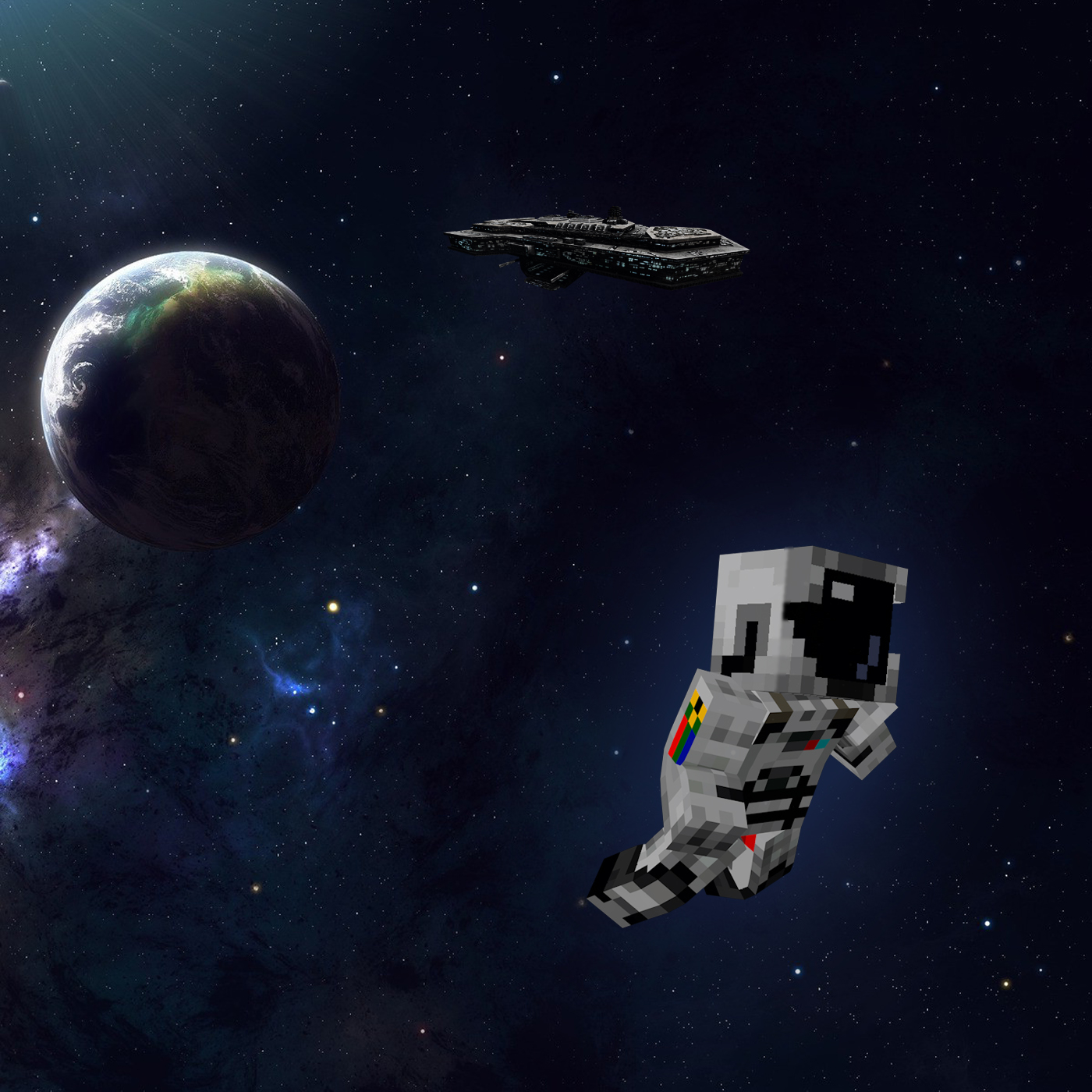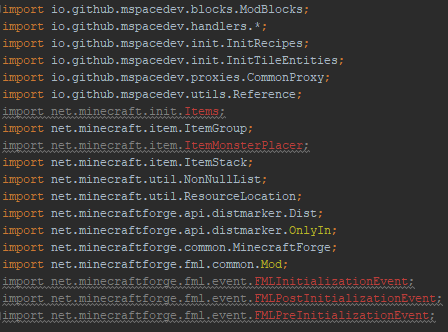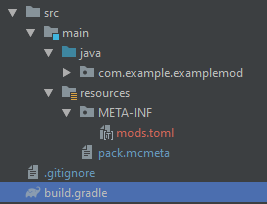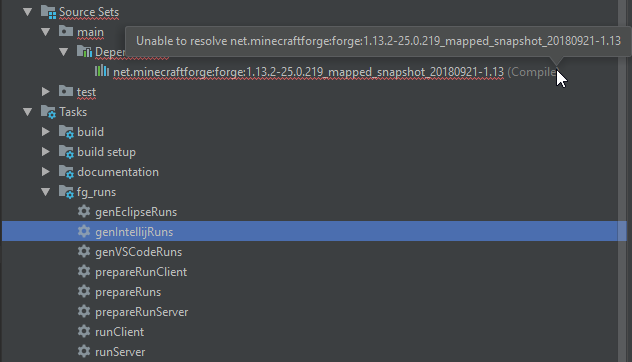-
Posts
180 -
Joined
-
Last visited
-
Days Won
1
Everything posted by MSpace-Dev
-

[1.14.4] ASM causing issues with static initializers
MSpace-Dev replied to MSpace-Dev's topic in Modder Support
https://github.com/MSpaceDev/CustomChests/tree/1.14.4/src/main/java/com/mspacedev -
I have a class called FileManager that manages many things to do with my custom mod files. I'm trying to create a static constant that allows me to reference an array of files whenever I want. However, my program throws an ExceptionInInitializerError. I took a similar test to a basic static void main program, and the program compiled fine. I can't see what I'm doing wrong in my main program below. Here are the relevant files: Log: [11:26:14] [Client thread/ERROR] [ne.mi.fm.ja.FMLModContainer/]: Exception caught during firing event: null Index: 1 Listeners: 0: NORMAL 1: ASM: class com.mspacedev.ModEventSubscriber onRegisterBlocks(Lnet/minecraftforge/event/RegistryEvent$Register;)V 2: ASM: class com.mspacedev.ModEventSubscriber onRegisterItems(Lnet/minecraftforge/event/RegistryEvent$Register;)V java.lang.ExceptionInInitializerError at com.mspacedev.util.Data$Chests.getChestProperties(Data.java:16) at com.mspacedev.ModEventSubscriber.onRegisterBlocks(ModEventSubscriber.java:28) at net.minecraftforge.eventbus.ASMEventHandler_0_ModEventSubscriber_onRegisterBlocks_Register.invoke(.dynamic) at net.minecraftforge.eventbus.ASMEventHandler.invoke(ASMEventHandler.java:80) FileManager: // Files public static final ArrayList<File> chestFiles = getFilesInPath("customchests/chests/"); private static ArrayList<File> getFilesInPath(final String pathName) { ArrayList<File> files = new ArrayList<>(); File folder = new File(pathName); for (final File fileEntry : folder.listFiles()) { if (fileEntry.isDirectory()) continue; files.add(new File(fileEntry.getName())); } return files; } I call this in my RegistryEvent.Register<Block> function: if (!FileManager.chestFiles.isEmpty()) And it returns a NullReferenceException because of the earlier ExceptionInInitializerError
-

[1.14.4] Dynamic block/entity/item etc based on other mods
MSpace-Dev replied to MSpace-Dev's topic in Modder Support
Ah, thanks. I will look into it further tomorrow morning. I have to head off to sleep, but hope I can get something working. Forge 1.14 is a rather large step in the right direction from what I've seen so far! -

[1.14.4] Dynamic block/entity/item etc based on other mods
MSpace-Dev replied to MSpace-Dev's topic in Modder Support
How would I achieve something like that roughly? Any suggestions / resources I can look into? -

[1.14.4] Dynamic block/entity/item etc based on other mods
MSpace-Dev replied to MSpace-Dev's topic in Modder Support
I want to expand my mod's features lots in 1.14.4. I want users to be able to specify mobIDs from other mods in JSON to initialise a new item, block and entity for the specified id. To do this, I need to be able to dynamically create these objects. It would be perfect for my mod. You will be able to see that at a quick glance I think: https://www.curseforge.com/minecraft/mc-mods/monster-totems -

[1.14.4] Dynamic block/entity/item etc based on other mods
MSpace-Dev replied to MSpace-Dev's topic in Modder Support
So, creating new entity types based on other mods is impossible? -

[1.14.4] Dynamic block/entity/item etc based on other mods
MSpace-Dev replied to MSpace-Dev's topic in Modder Support
Well, that actually does not run. DeferredWorkQueue#runLater does not get called. -

[1.14.4] Dynamic block/entity/item etc based on other mods
MSpace-Dev replied to MSpace-Dev's topic in Modder Support
I've been doing some research. What are your thoughts on this method? @SubscribeEvent public static void onRegisterEntities(final RegistryEvent.Register<EntityType<?>> event) { DeferredWorkQueue.runLater(() -> { entityBuilder(event); }); } private static void entityBuilder(final RegistryEvent.Register<EntityType<?>> event) { ArrayList<EntityType<?>> all_entities; all_entities = (ArrayList<EntityType<?>>) event.getRegistry().getValues(); Main.LOGGER.debug("ALL LOADED ENTITIES:"); all_entities.forEach(p -> Main.LOGGER.debug(p)); } And will I be able to register new entities under new IDs using the methods within EntityType and ForgeRegistries.ENTITIES? (If I don't go with this method ^) -
Is it possible to get all loaded entities in the registry (from all other mods) at runtime, to then be able to spawn in said entity within my mod? I feel it might be possible now, with how structured the registry events are in 1.14. I am also trying to generate new entities at runtime based on this by using a builder pattern of sorts.
-
In FG 2.3, there was a function called replace. It has now been removed / changed in 1.14.4. Here is the function in FG 2.3. /** * Add a source replacement mapping * * @param token The token to replace * @param replacement The value to replace with */ public void replace(Object token, Object replacement) { replacements.put(token.toString(), replacement); } /** * Add a map of source replacement mappings * * @param map A map of tokens -> replacements */ public void replace(Map<Object, Object> map) { for (Entry<Object, Object> e : map.entrySet()) { replace(e.getKey(), e.getValue()); } } This was useful as it allowed me to edit my version in only gradle.properties replace "@VERSION@", project.version replaceIn "utils.Reference.java"
-

[1.12.2] TE persists when shouldRefresh() returns false
MSpace-Dev replied to MSpace-Dev's topic in Modder Support
Ah, I see thanks. Got it working nicely like this @Override public boolean shouldRefresh(World world, BlockPos pos, IBlockState oldState, IBlockState newState) { // Only refresh if new state is not an instance of BlockTotemBase return !(newState.getBlock() instanceof BlockTotemBase); } -
I've set TileEntity#shouldRefresh to false so that I can update the blockstate without it resetting its values. However, this makes the tile entity persist when its block is broken. I've added world.removeTileEntity(pos) in theBlock#blockBreak override function. However, the TE still persists. I can verify it is getting called. Am I missing something here? @Override public void breakBlock(World worldIn, BlockPos pos, IBlockState state) { if (!worldIn.isRemote) { if (worldIn.getTileEntity(pos) != null) { if (worldIn.getTileEntity(pos) instanceof TileEntityTotemBase) { TileEntityTotemBase totemBase = (TileEntityTotemBase) worldIn.getTileEntity(pos); // Update totem on Client totemBase.setTotemProperties(); totemBase.sendUpdates(); } } } worldIn.removeTileEntity(pos); // Redundant as super() calls it anyways. Probably need some other calls to remove TE! super.breakBlock(worldIn, pos, state); }
-

[1.12.2] Change texture for block at runtime
MSpace-Dev replied to MSpace-Dev's topic in Modder Support
Ah, alright, got it! Will stick to blockstates then -

[1.12.2] Change texture for block at runtime
MSpace-Dev replied to MSpace-Dev's topic in Modder Support
Yes, I saw it's using 2 entirely different blocks. Is that a recommended way to do it? Would I have to create a new Block class for every block where I want its texture to change at runtime? -
I have a custom tile entity that can switch between 2 states, simply with bool = !bool When this switch happens, I would like to change one of the texture references in the model.JSON to switch to another texture. How can I achieve this. (There are multiple textures in the single model) I noticed the furnace DOES NOT use blockstates for this. So, interested in how that was done. If not, I will end up using blockstates. Thanks
-

[1.14.4][1.13.2] Unable to resolve net.minecraftforge.forge
MSpace-Dev replied to MSpace-Dev's topic in ForgeGradle
Alright, thanks. Is there by any chance a resource where I can find information like that myself? Instead of asking for every single change ? -

[1.14.4][1.13.2] Unable to resolve net.minecraftforge.forge
MSpace-Dev replied to MSpace-Dev's topic in ForgeGradle
Now that my project is updated. Where can I find info on the changes to all the function names? I've migrated the namespaces using the MCP XML. However, it only goes up to 1.13-to-1.13.1.xml These are the resources I've found so far: https://mcforge.readthedocs.io/en/1.13.x/ https://gist.github.com/williewillus/353c872bcf1a6ace9921189f6100d09a Got things like this happening Just not sure where to begin finding what these have changed to. -

[1.14.4][1.13.2] Unable to resolve net.minecraftforge.forge
MSpace-Dev replied to MSpace-Dev's topic in ForgeGradle
Updating Gradle to v5.0 seemed to work! In Powershell: gradle wrapper --gradle-version 5.0 After updating, the Gradle refresh did not fail. -

[1.14.4][1.13.2] Unable to resolve net.minecraftforge.forge
MSpace-Dev replied to MSpace-Dev's topic in ForgeGradle
-

[1.14.4][1.13.2] Unable to resolve net.minecraftforge.forge
MSpace-Dev replied to MSpace-Dev's topic in ForgeGradle
Alright, so I've downloaded a completely fresh 1.14.3 MDK and moved it into an empty folder. IMported with IntelliJ. Didn't even put my src in. So bare bones project. 1. Downloaded and extracted 1.14.4 Forge MDK to new folder 2. Imported Gradle project using build.gradle in IntelliJ 2019 3. Ran "gradlew genIntelliJRuns" using terminal. 4. Ran "gradlew genIntelliJRuns --no-daemon" using terminal. 5. Ran "gradlew --refresh-dependencies" using terminal. Note: Steps 3-5 ran without any errors. Note2: I refreshed Gradle multiple times. Auto-import is also enabled. I get this error now when I refresh Gradle And this error: Project structure: -

[1.14.4][1.13.2] Unable to resolve net.minecraftforge.forge
MSpace-Dev replied to MSpace-Dev's topic in ForgeGradle
Ah, awesome. Thanks for the heads up! -

[1.14.4][1.13.2] Unable to resolve net.minecraftforge.forge
MSpace-Dev posted a topic in ForgeGradle
Hey all, Trying to update my 1.12.2 project here TO 1.13.2. I've done the following steps exactly in this order: 1. Downloaded and extracted 1.13.2 Forge MDK to new folder 2. Moved over my 'src' and 'run' folder into MDK folder 3. Imported Gradle project using build.gradle in IntelliJ 2019 4. Ran "gradlew genIntelliJRuns" using terminal. 5. Ran "gradlew --refresh-dependencies" using terminal. Note: Both steps 4-5 ran WITHOUT any build errors. Note2: I refreshed Gradle multiple times throughout. Auto-import is also enabled, so the project has been refreshed multiple times at least. No question. Error: "Unable to resolve net.minecraftforge.forge:1.13.2-25.0.219" Though, some commands produced this output. Not sure if I can safely ignore it or not. Deprecated Gradle features were used in this build, making it incompatible with Gradle 5.0. Use '--warning-mode all' to show the individual deprecation warnings. See https://docs.gradle.org/4.9/userguide/command_line_interface.html#sec:command_line_warnings build.gradle (Just generic one from the zip file) buildscript { repositories { maven { url = 'https://files.minecraftforge.net/maven' } jcenter() mavenCentral() } dependencies { classpath group: 'net.minecraftforge.gradle', name: 'ForgeGradle', version: '3.+', changing: true } } apply plugin: 'net.minecraftforge.gradle' // Only edit below this line, the above code adds and enables the necessary things for Forge to be setup. apply plugin: 'eclipse' apply plugin: 'maven-publish' version = '1.0' group = 'com.yourname.modid' // http://maven.apache.org/guides/mini/guide-naming-conventions.html archivesBaseName = 'modid' sourceCompatibility = targetCompatibility = compileJava.sourceCompatibility = compileJava.targetCompatibility = '1.8' // Need this here so eclipse task generates correctly. minecraft { // The mappings can be changed at any time, and must be in the following format. // snapshot_YYYYMMDD Snapshot are built nightly. // stable_# Stables are built at the discretion of the MCP team. // Use non-default mappings at your own risk. they may not always work. // Simply re-run your setup task after changing the mappings to update your workspace. mappings channel: 'snapshot', version: '20180921-1.13' // makeObfSourceJar = false // an Srg named sources jar is made by default. uncomment this to disable. // accessTransformer = file('build/resources/main/META-INF/accesstransformer.cfg') // Default run configurations. // These can be tweaked, removed, or duplicated as needed. runs { client { workingDirectory project.file('run') // Recommended logging data for a userdev environment property 'forge.logging.markers', 'SCAN,REGISTRIES,REGISTRYDUMP' // Recommended logging level for the console property 'forge.logging.console.level', 'debug' mods { examplemod { source sourceSets.main } } } server { workingDirectory project.file('run') // Recommended logging data for a userdev environment property 'forge.logging.markers', 'SCAN,REGISTRIES,REGISTRYDUMP' // Recommended logging level for the console property 'forge.logging.console.level', 'debug' mods { examplemod { source sourceSets.main } } } } } dependencies { // Specify the version of Minecraft to use, If this is any group other then 'net.minecraft' it is assumed // that the dep is a ForgeGradle 'patcher' dependency. And it's patches will be applied. // The userdev artifact is a special name and will get all sorts of transformations applied to it. minecraft 'net.minecraftforge:forge:1.13.2-25.0.219' // You may put jars on which you depend on in ./libs or you may define them like so.. // compile "some.group:artifact:version:classifier" // compile "some.group:artifact:version" // Real examples // compile 'com.mod-buildcraft:buildcraft:6.0.8:dev' // adds buildcraft to the dev env // compile 'com.googlecode.efficient-java-matrix-library:ejml:0.24' // adds ejml to the dev env // The 'provided' configuration is for optional dependencies that exist at compile-time but might not at runtime. // provided 'com.mod-buildcraft:buildcraft:6.0.8:dev' // These dependencies get remapped to your current MCP mappings // deobf 'com.mod-buildcraft:buildcraft:6.0.8:dev' // For more info... // http://www.gradle.org/docs/current/userguide/artifact_dependencies_tutorial.html // http://www.gradle.org/docs/current/userguide/dependency_management.html } // Example for how to get properties into the manifest for reading by the runtime.. jar { manifest { attributes([ "Specification-Title": "examplemod", "Specification-Vendor": "examplemodsareus", "Specification-Version": "1", // We are version 1 of ourselves "Implementation-Title": project.name, "Implementation-Version": "${version}", "Implementation-Vendor" :"examplemodsareus", "Implementation-Timestamp": new Date().format("yyyy-MM-dd'T'HH:mm:ssZ") ]) } } // Example configuration to allow publishing using the maven-publish task // we define a custom artifact that is sourced from the reobfJar output task // and then declare that to be published // Note you'll need to add a repository here def reobfFile = file("$buildDir/reobfJar/output.jar") def reobfArtifact = artifacts.add('default', reobfFile) { type 'jar' builtBy 'reobfJar' } publishing { publications { mavenJava(MavenPublication) { artifact reobfArtifact } } repositories { maven { url "file:///${project.projectDir}/mcmodsrepo" } } } -

[1.12.2] lang file not working for entities
MSpace-Dev replied to MSpace-Dev's topic in Modder Support
Oh, I understand now. Something like modid_mob_name ? -

[1.12.2] lang file not working for entities
MSpace-Dev replied to MSpace-Dev's topic in Modder Support
Alright, I've moved everything to being registered through the registry event and EntityEntryBuilder. My entities are exactly the same in world, so it's working. The lang file is still not working for them though. RegistryEventHandler @SubscribeEvent public static void registerEntities(RegistryEvent.Register<EntityEntry> event) { final IForgeRegistry<EntityEntry> registry = event.getRegistry(); for (final EntityEntry entityEntry : ModEntities.ENTITIES) { registry.register(entityEntry); } } ModEntities public class ModEntities { private static int id = 1500; public static final EntityEntry[] ENTITIES = { getEntityEntry("mob_name", "Mob Name", EntityMob.class, 16167425, 16775294) }; private static EntityEntry getEntityEntry(String nameId, String entityName, Class<? extends Entity> entityClass, int eggPrimary, int eggSecondary) { return EntityEntryBuilder.create() .entity(entityClass) .id(new ResourceLocation(Reference.MODID, nameId),++id) .name(entityName) .tracker(64, 1, false) .egg(eggPrimary, eggSecondary) .spawn(EnumCreatureType.MONSTER, 0, 0, 0, Biomes.VOID) .build(); } } en_us #### Entities #### entity.mod_id.mob_name.name=Mob Name entity.mob_name.name=Mob Name Am I missing something? -
Hey all, I'm trying to get my spawn eggs to not display as "entity.mob_name.name", but rather as "Spawn mob_name" like Vanilla's spawn eggs. Here is the necessary information. InitEntities.class public class InitEntities { private static int id = 1500; public static void register() { registerEntity("mob_id", "Mob Name", EntityMob.class, 16167425, 16775294); Utils.getLogger().info("Entities Registered"); } private static void registerEntity(String nameId, String entityName, Class<? extends Entity> entityClass, int eggPrimary, int eggSecondary) { EntityRegistry.registerModEntity(new ResourceLocation(Reference.MODID, nameId), entityClass, entityName, ++id, Reference.MODID, 64, 1, false, eggPrimary, eggSecondary); } } Main class public static final CreativeTabs creativeTab = new CreativeTabs(CreativeTabs.getNextID(), "modid") { @Override @SideOnly(Side.CLIENT) public void displayAllRelevantItems(NonNullList<ItemStack> itemList) { super.displayAllRelevantItems(itemList); itemList.add(getSpawnEgg("mob_id")); } }; en_us.lang (I've tried both of these separately. No luck.) [All other translations are working fine] #### Entities #### entity.mod_id.mob_id.name=Mob Name entity.mob_id.name=Mob Name Thanks.






